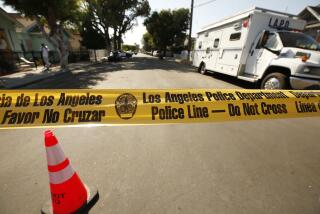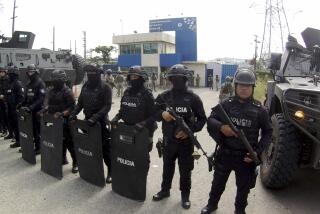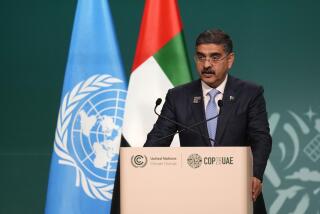As Terrorist Acts Multiply, Iraqis Are Expelled : Terrorism: Alerts have gone out around the world. Some suspects have been arrested in the U.S.
- Share via
Governments around the world Monday began expelling Iraqi diplomats and other foreign nationals suspected of terrorism.
“There’s a war going on,” said a Dutch official, “and we want them the hell out.”
In Beirut, terrorists shot a rocket-propelled grenade at the Italian Embassy. Officials in Manila deported an Iraqi consul general accused of directing the bungled bombing of a U.S. cultural center. In California, two men were arrested on charges of making bomb threats, one against an Arab-American group and the other against an airliner.
Airports and government installations from London to Tokyo went on high alert.
Officials feared a growing response to Saddam Hussein’s call for all Muslims to launch a “holy war” against the United States and members of its anti-Iraq coalition. Western diplomats said the bombing in the Philippines was part of a round-the-world terror campaign being mounted by killers dispatched from Baghdad.
In Istanbul, Turkey, explosives severely damaged a U.S. military customs clearance depot. There were no casualties, but the blast was so large that windows were blown out of surrounding workshops and offices.
Responsibility for the bombing was claimed by anonymous callers to Turkish newspapers in the name of Dev-Sol, the banned Revolutionary Left, who said the action was taken to protest U.S. imperialism and the use of force in the Persian Gulf. The bombing struck fear into the heart of the Turkish community.
There were fears of terrorism in Los Angeles as well. County sheriff’s deputies took Shaker Famy Rezk, 37, of Calabasas into custody Sunday on suspicion of telephoning a sheriff’s substation to announce that he had placed a bomb on a plane bound from Los Angeles to the Middle East.
He was accused of making the 911 call to the sheriff’s substation in Malibu. Rezk was booked on suspicion of filing a false report of a bomb and was being held in lieu of $50,000 bail.
Los Angeles police arrested Kurt Haber, 60, a Beverly Hills construction engineer and Jewish survivor of the Holocaust, and booked him on suspicion of making a terrorist threat--a felony. Officers said Haber telephoned Nazih Bayda, regional director of the Arab-American Anti-Discrimination Committee, last Thursday.
Bayda said that a telephone caller told him: “You bastards just bombed my country with chemical weapons, and I will bomb your office tonight.”
On Monday, Haber told reporters: “All I wanted to do was scare him.”
Elsewhere in the United States, a 15-year-old high school student in Lakeland, Fla., was arrested for allegedly pipe-bombing the home of a family from India he mistook to be Iraqi. No one was injured in the attack.
Police said the family received a phone call about a half-hour before the bomb was thrown against their garage door. Police, in quoting the caller, said: “Go back to Iraq or something like a missile attack might happen.”
In Manila, Philippine Foreign Secretary Raul Manglapus ordered the expulsion within 72 hours of Muwafak Ani, the Iraqi consul general and first secretary, citing “strong evidence” that he was linked to an attempted bombing last Saturday of the Thomas Jefferson Cultural Center.
Ani could not be reached on Monday. A day earlier, he denied having anything to do with the bombing, saying, “Our position is Iraq has no intention at all to disturb Philippine security.”
The bomb, thought to have been made from 20 pounds of dynamite, exploded prematurely down the block from the cultural center. One Iraqi, Ahmad J. Ahmad, was blown to bits and his companion, Abdul Saad Kadham, was badly burned.
Kadham asked emergency room doctors to notify the Iraqi Embassy and gave them the embassy’s telephone number, officials said.
The two Iraqis had arrived Dec. 6 from Bangkok on tourist visas. They had obtained visa extensions. Ani met with them at least five times before the attempted bombing, including a final meeting at the Iraqi Embassy about two hours before the blast, according to Western officials.
Ani’s car was used to ferry the two men, said Andrea Domingo, the Philippine immigration commissioner. There were conflicting reports that Ani had accompanied them. Both men had bought airline tickets with cash and apparently had planned to flee right after the bombing, Manglapus said.
“Clearly, Iraqi diplomats were involved and were running this out of the embassy,” one diplomat said. Another envoy said that Ani also had tried to recruit Filipino Communist rebels to join terrorist attacks here.
“We believe he’s an intelligence officer,” the envoy said.
One senior diplomat warned: “There’s no question in our minds these two were Iraqi terrorists, and they were part of a group dispatched in teams to various parts of the world to carry out terrorist acts in what they call ‘deep in the enemy rear.’ These guys have been posted all over.”
Another Iraqi thought to be an intelligence operative, who arrived recently from Pakistan and is staying at the embassy, will be asked to leave as well, sources said. Still another Iraqi, Shamir Abdul Sattar, was arrested by the Philippine National Bureau of Investigation and was being questioned.
Domingo said Sattar is the son of a former Iraqi ambassador to the Philippines, now posted in Somalia. At one point, sources said, Sattar had driven both of the men involved in the bombing to the U.S. Information Service building in the Makati business district in a car with diplomatic license plates.
Investigators said that Sattar heads the Iraqi Student Assn. of the Philippines at the University of Manila. He holds a diplomatic passport but is not accredited to the government here, according to Remigo Santa Ana, immigration intelligence chief.
The U.S. Embassy announced that it was closing the USIS library in Manila and in two other Philippine cities, and advised U.S. diplomats and officials to keep their children home from school.
A statement issued by the embassy said the attempted bombing was “an example of the announced Iraqi intention to target U.S. and allied installations and interests.”
Philippine officials stepped up surveillance of groups thought to be sympathetic to Iraq, including at least eight suspected members of the Japanese Red Army Faction, according to immigration commissioner Domingo.
The radical leftist group staged a 1972 attack at Tel Aviv’s airport that killed 28 people and injured 79, and destroyed a Japan Airlines plane in Libya in 1973. Intelligence officials say they believe that the group has only about 20 to 30 members and works closely with Arab groups opposed to the United States and Israel.
Domingo said Israelis also would be monitored because Israel had threatened to retaliate for Scud missile attacks by Baghdad. “We have to be extra careful,” Domingo warned. “Our problem now is to monitor all Middle Eastern nationals . . . We do not want them to transport violence here.”
Philippine police and immigration agents fanned out to schools, hotels and rooming houses searching for Iraqis, Jordanians, Lebanese, Iranians and other students who have arrived since October or who have overstayed their visas. The officials have identified about 60 Iraqi students here--and about 900 other Arabs believed sympathetic to Iraq.
Security also was tightened at the Manila airport, where immigration officers turned back one Iraqi and two Jordanians who arrived from Taiwan on Monday. “The reason they gave us for visiting the country was flimsy,” said Adelia Lavares, airport immigration chief.
Other Southeast Asian countries that support the U.S.-led war against Iraq, including Thailand and Singapore, were bracing for expected terrorist attacks by Iraqis and their sympathizers.
The blast in Manila followed an attempted bombing Friday at the Jakarta residence of John Monjo, the U.S. ambassador to Indonesia. An official said the ambassador’s gardener found a bag containing 26 sticks of dynamite stashed in a planter “next to where the ambassador eats breakfast.”
The battery for the bomb’s timer was dead, he said.
Heavily armed troops were stationed at embassies of the United States, Britain, Australia and Saudi Arabia in Jakarta.
Indonesia is the world’s largest Muslim country, with more than 90% of its 179 million people professing to be Islam. The giant island nation complied with U.N. resolutions calling for Iraqi withdrawal from Kuwait issue but has been neutral in the Persian Gulf conflict.
In Thailand, U.S. officials extended a terrorist alert Monday for the U.S., British, Israeli and Australian embassies, and Thai immigration officials said they were monitoring suspected Japanese Red Army members.
Hundreds of heavily armed Thai troops have guarded the embassies, Bangkok’s airports and foreign airline offices ever since the U.S. Embassy announced on Saturday that it had received “a credible threat” of terrorist activity aimed at the four countries and their flag air carriers.
The U.S. Embassy in Singapore also issued a warning on Sunday that it had received “credible information” of terrorist activity and threats in Southeast Asia. The embassy advised all American citizens and businesses to increase security, including postponing non-essential travel.
In other parts of the world, Iraqi diplomats have been expelled from Britain, Belgium, France, Greece, Italy and Pakistan since the Gulf War began. There have been bombings in Beirut--the latest on Sunday at the British Bank of the Middle East. It was not clear who carried out the attack.
On Monday, a rocket-propelled grenade was fired at the Italian Embassy in Beirut, causing minor damage. U.S. Ambassador Ryan Crocker and his American staff were evacuated from the American Embassy on Saturday because of the threat of terrorist attack.
The Netherlands deported five Iraqi diplomats.
In Vienna, police said 11 Iranians were being interrogated after being detained in Austria with material indicating that they belonged to fundamentalist groups associated with terrorism.
Egypt’s liberal Al Ahrar magazine reported Monday that authorities had arrested 17 pro-Iraqi terrorists who entered the country with forged documents. Those arrested were Palestinian and Jordanian, the magazine said.
Meanwhile, airlines operating in the Middle East reported partial resumption of service despite the war and the threat of terrorism.
British Airways said it would resume flights to Muscat in Oman and the United Arab Emirates. Gulf Airways announced increased service between Muscat, Oman, and Abu Dhabi and Dubai in the United Arab Emirates.
But airspace over Bahrain remained closed.
Drogin reported from Manila and Wallace from Manama, Bahrain. Times staff writers Kenneth Reich and Richard A. Serrano in Los Angeles also contributed to this story.
More to Read
Sign up for Essential California
The most important California stories and recommendations in your inbox every morning.
You may occasionally receive promotional content from the Los Angeles Times.














